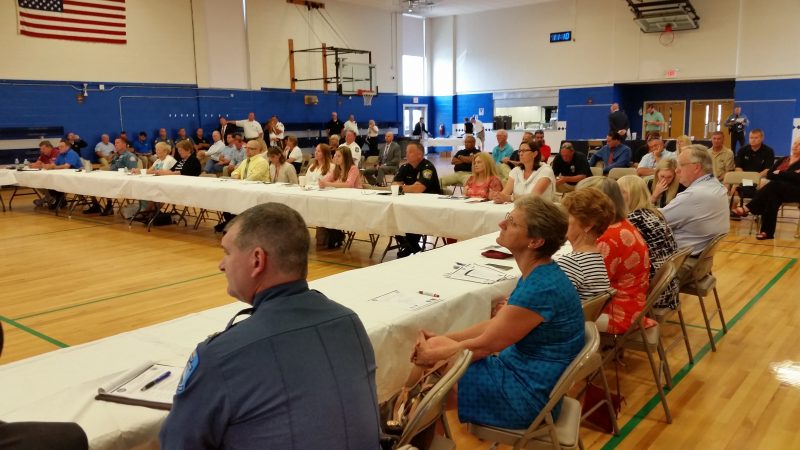The audience at the Avalon Community Hall was told that every community in New Jersey is a potential terrorism target.
 By Donald Wittkowski
The Jersey Shore’s picturesque beaches, oceanfront mansions and family-friendly boardwalks certainly don’t seem like the backdrop for potential terrorist attacks.
But senior law-enforcement officials warned Wednesday that seashore communities are not immune to possible terrorism strikes and should never lull themselves into a false sense of security.
Cape May County Prosecutor Robert Taylor, one of the speakers during a homeland security forum in Avalon, bluntly told the audience that terrorism “can happen anywhere in the state of New Jersey.”
“There’s an attitude out there of, ‘It can’t happen here, this is Cape May County,’” Taylor said.
Taylor noted that two of the terrorists from the Sept. 11, 2001, attacks were on the Wildwood Boardwalk using an ATM machine before they flew a hijacked airliner into the World Trade Center. One of them had attempted to sign up for flying lessons at the Cape May County Airport, he said.
In another brush with a possible terrorist scheme, two plotters allegedly scouted out the Cape May Harbor as a potential target. They instead set their sights on Fort Dix in New Jersey as part of a planned attack against U.S. soldiers in 2007 that was thwarted by authorities, Taylor said.
By Donald Wittkowski
The Jersey Shore’s picturesque beaches, oceanfront mansions and family-friendly boardwalks certainly don’t seem like the backdrop for potential terrorist attacks.
But senior law-enforcement officials warned Wednesday that seashore communities are not immune to possible terrorism strikes and should never lull themselves into a false sense of security.
Cape May County Prosecutor Robert Taylor, one of the speakers during a homeland security forum in Avalon, bluntly told the audience that terrorism “can happen anywhere in the state of New Jersey.”
“There’s an attitude out there of, ‘It can’t happen here, this is Cape May County,’” Taylor said.
Taylor noted that two of the terrorists from the Sept. 11, 2001, attacks were on the Wildwood Boardwalk using an ATM machine before they flew a hijacked airliner into the World Trade Center. One of them had attempted to sign up for flying lessons at the Cape May County Airport, he said.
In another brush with a possible terrorist scheme, two plotters allegedly scouted out the Cape May Harbor as a potential target. They instead set their sights on Fort Dix in New Jersey as part of a planned attack against U.S. soldiers in 2007 that was thwarted by authorities, Taylor said.

 Jeffrey Elgrim, left, and Joseph Conrey, senior officials with the New Jersey Office of Homeland Security and Preparedness, outlined steps for communities to protect themselves from terrorism.
Joseph Conrey, critical infrastructure coordinator for the NJOHSP, said local police departments should consider erecting barriers or closing off ramps to the boardwalks to protect them against “ramming” attacks such as the one involving a cargo truck that plowed into a crowd in Nice, France, last year, killing 86 people.
“There’s no one-size-fits-all. It’s really event-driven or threat-driven,” Conrey said while encouraging police to be flexible in their planning and security procedures for major events.
Emphasizing the importance of tourism for the Jersey Shore, the speakers said they did not want to discourage any communities from holding large events. They also said people should not be paralyzed by fear over the possibility of terrorism.
Jeffrey Elgrim, an intelligence planner with the NJOHSP, characterized New Jersey’s intelligence and counterterrorism programs as a model for other states across the country.
“Everyone wants to emulate what we do,” he said.
At the same time, Elgrim pointed out that no one should underestimate the possibility of terrorism happening at the Jersey Shore.
“Just because you’re in Cape May County, you’re not immune anymore,” he said.
Jeffrey Elgrim, left, and Joseph Conrey, senior officials with the New Jersey Office of Homeland Security and Preparedness, outlined steps for communities to protect themselves from terrorism.
Joseph Conrey, critical infrastructure coordinator for the NJOHSP, said local police departments should consider erecting barriers or closing off ramps to the boardwalks to protect them against “ramming” attacks such as the one involving a cargo truck that plowed into a crowd in Nice, France, last year, killing 86 people.
“There’s no one-size-fits-all. It’s really event-driven or threat-driven,” Conrey said while encouraging police to be flexible in their planning and security procedures for major events.
Emphasizing the importance of tourism for the Jersey Shore, the speakers said they did not want to discourage any communities from holding large events. They also said people should not be paralyzed by fear over the possibility of terrorism.
Jeffrey Elgrim, an intelligence planner with the NJOHSP, characterized New Jersey’s intelligence and counterterrorism programs as a model for other states across the country.
“Everyone wants to emulate what we do,” he said.
At the same time, Elgrim pointed out that no one should underestimate the possibility of terrorism happening at the Jersey Shore.
“Just because you’re in Cape May County, you’re not immune anymore,” he said.
 The audience at the Avalon Community Hall was told that every community in New Jersey is a potential terrorism target.
A major focus of the homeland security conference was the role that Cape May County businesses may play in protecting their communities against terrorism. The Cape May County Chamber of Commerce helped to organize the event.
The security forum was designed to train and educate the owners and operators of popular seashore attractions, such as restaurants, cafes, theaters, stores, boardwalks and entertainment venues.
Vicki Clark, president of the Cape May County Chamber of Commerce, noted that tourism is the lifeblood of the seashore communities. She said local businesses “need to be more engaged” about the potential threat of terrorism because they come in contact with so many tourists.
“We know how important it is to provide a safe environment for our visitors and residents,” Clark said.
She added, “Anything can happen – anytime, anywhere.”
The audience at the Avalon Community Hall was told that every community in New Jersey is a potential terrorism target.
A major focus of the homeland security conference was the role that Cape May County businesses may play in protecting their communities against terrorism. The Cape May County Chamber of Commerce helped to organize the event.
The security forum was designed to train and educate the owners and operators of popular seashore attractions, such as restaurants, cafes, theaters, stores, boardwalks and entertainment venues.
Vicki Clark, president of the Cape May County Chamber of Commerce, noted that tourism is the lifeblood of the seashore communities. She said local businesses “need to be more engaged” about the potential threat of terrorism because they come in contact with so many tourists.
“We know how important it is to provide a safe environment for our visitors and residents,” Clark said.
She added, “Anything can happen – anytime, anywhere.”